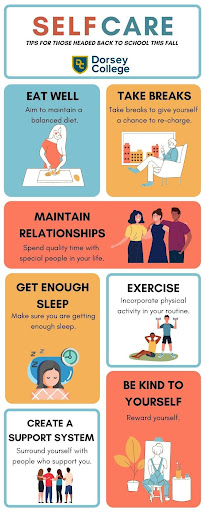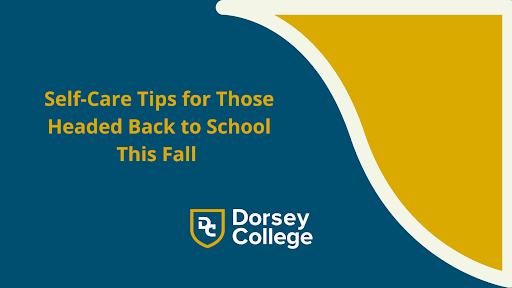Self-care is probably one of the biggest buzzwords of the early 2020s. The phrase has been trending quite a bit these days, and for good reason. Most people have heard the term “self-care.” In fact, according to Google, the number of searches for self-care has more than doubled since 2015¹. Fewer people know what actual self-care means and entails.
In some cases, self-care has been presented as selfish and reckless behavior. True self-care is far from self-centered or dangerous, though. Self-care means mindfully taking care of yourself, both physically and mentally. It involves limiting the stuff that stresses you out and making time for stuff that helps you relax. Self-care is a trendy concept right now because so many people need it. As a society we are suffering from the consequences of too much stress, work, and lack of mindfulness.
The fall season coupled with many returning to school is the perfect time to adopt some self-care tips and tactics. Educators and students have new schedules to adjust to. Parents and others living with educators and students also typically face changes to their schedule. This makes it the perfect time to adopt some new self-care habits and incorporate positive changes into our daily routine.
Note: The information presented here is meant for informational purposes only and should not serve as a replacement for medical advice. If you have questions regarding your own health, consult with your healthcare provider.
Eat Well
When someone tells you to eat well your mind usually goes to eating healthy foods and dieting. But there is more to eating well than just eating foods that are good for you. How you eat, where you eat and when you eat are just as important as what you eat. Here’s some quick self-care tips for eating. ²
- Healthy Eating Environment: To look at eating well from a self-care lens, focus on changing the how, when and where you eat. Do you find yourself eating on the go or in distracting environments? Try making a specific time for your meals in a relaxing environment. People tend to overeat when distracted or stressed out. If you find it hard to find time to make meals after a day of work or school, try meal prepping. Once prepared, you can enjoy your meals in whatever environment you find relaxing.
- Don’t Starve Yourself: Listen to your body when it’s hungry. People often neglect snacks and even full out meals “in order to stay on the grind”. Diet culture tells us being hungry is wrong and tells us to regulate food and push past hunger. Self-care, however, requires being mindful of what your body is telling you. Snacking when hungry is ultimately better than scarfing down an ‘on the go’ meal at the end of the day.
- Practice Mindfulness: Also, be mindful of what you’re putting in your body. Practice mindful thinking while eating. Make cooking and eating something you look forward to. You’ll be less likely to overeat and more likely to relax and love the food you’re making and enjoying.
Take Breaks
In our culture breaks are often seen as frivolous. We sometimes glorify sacrifice and constantly staying busy. Because overworking is so common, people often neglect breaks. Sometimes they even receive praise or feel “stronger” for “resisting” the urge to take a break.
In reality though, the notion that breaks are bad comes from an outdated mindset. Everyone needs breaks. Plus, you’re more productive at work and life in general when you take time to refresh.
Even small breaks (10-20 minutes) can have a major positive impact on productivity and de-stressing. There are lots of ways to take productive, stress reducing breaks. Because we’re all different and relax in different ways, take time to think about what you want to get out of your break. Scheduling time for breaks can be helpful if you feel guilty about taking a break. That way the break is planned and will feel more like a necessary part of your day (as it should be!).
Practice mindfulness while on break by truly thinking about the moment and what you are doing to relax. Enjoy your break!
Maintain Relationships
In movies and TV it’s normal to see plotlines revolving around a character neglecting their friends and family for work. This common sitcom trope, of course, is an instance of art imitating life. It can be hard in our busy culture to find time for relationships. Taking time to remember the big picture, and what really matters to you can be achieved by actively maintaining relationships.
For most of us, our loved ones are a big part of our life, even if we don’t always get to see them. Taking time for a phone call or a family or friend dinner can actively reduce stress and help you remain grounded: focused on what really matters.
Like breaks, you can start working on spending more time with your relationships by scheduling time to be with your loved ones.
Get Enough Sleep
Sleep is something we all need and most of us don’t get enough of. Most people are stuck in a cycle of being in sleep debt. Over time this can also hurt heart health. Nobody tries to have sleep debt, it’s just a natural side effect of the modern work week.
Humans all have different sleep patterns. Adults usually need 7-9 hours of sleep per night ³. So, some people require more sleep than others. We also have different chronotypes, or natural sleep patterns. Some of us will simply never work best from 8am to 5pm because of our natural sleep to wake schedule.
Learning your chronotype is a great way to start sleeping better. Even if your day schedule doesn’t match your chronotype, knowing your chronotype can help you schedule out your day. Your chronotype also provides the key to when you’re most active and alert in the day.
Rather than trying to sleep early and rise early, try molding your sleep schedule more around your chronotype. It’s more likely to work at getting you out of sleep debt. It’s important to be mindful of what helps you get your best sleep. Don’t just follow generic sleep advice, be mindful of what helps you. Getting enough sleep is very important for proper self-care, and a healthy lifestyle.
Exercise
Like eating and sleeping well, exercise can be a great source of proper self-care. Exercise can even help with getting better sleep⁵. To really explore exercise as self-care, take time to see exercise as a mindful, positive, fun part of your day or week.
The word exercise often has negative associations for some people. Maybe it brings to mind laps and gym class. But you have control over what exercise you choose to do, and you don’t have to do strenuous exercise if you don’t want to.
Think of something you like to do that gets you moving. Nature walks, dancing, even roller blading are all on the table here. As long as you have fun, and move, choosing to do something you find fun is one of the best ways to start exercising.
Self-care is about taking care of yourself in a mindful way. Make sure you don’t overdo exercising as you could end up injured, or even just more stressed out.
Create a Support System
We already discussed why relationships are so important for self-care. Support systems can be made up of the people in your close relationships but they don’t have to be. A support system is any group of people who look out for you. Building a strong support system can be hard as an adult. Finding friends is hard on its own, finding close, supportive friends might seem like an impossible task.
A great way to start building a support system is seeing who’s already rooting for you. You might be surprised by the amount of support you have available to us, because a lot of us don’t like to come to others for support. Realizing everyone needs support from others can help you adopt a more open mindset.
If you feel you lack a support system and don’t know how to start finding friends, it may be time to network. Figure out activities you like, or interests you want to explore. Then you can look for groups or classes of likeminded people to join. You could always try engaging with a friendly co-worker too. By focusing on what makes you happy you can organically grow a group of likeminded friends.
Be Kind to Yourself
This last tip seems self-explanatory. Everyone knows you’re not supposed to be mean to yourself. Self-esteem is important. It can be hard to maintain good self-esteem when life gets stressful. The world is a rough place, and it lets us know that. A lot of us are stressed out and battling tons of messages that say we’re not good enough. The biggest step in practicing self-care is self-love. Learning to love yourself for who you are is needed to reach true peace of mind.
If you’re struggling with self-esteem or being kind to yourself, think back to your child self. Imagine them cheering you on and realize how mean it would be to beat them up. Then take a step back and give yourself a pat on the back. Realize that even if there are things you can’t stand about yourself, the only way to fix them is to love yourself. It takes tons of self-love and self-care to make long term life improvements.

Sources
“Self Care”
“Eat Well”
“Get Enough Sleep”
4. Sleep Chronotype Quiz: Are You A Bear, Dolphin, Wolf Or Lion? | Puffy
“Exercise”
5. “Self-Care: Why Exercise?” SOVA, 5 Jan. 2017, sova.pitt.edu/bepositive-self-care-why-exercise.

